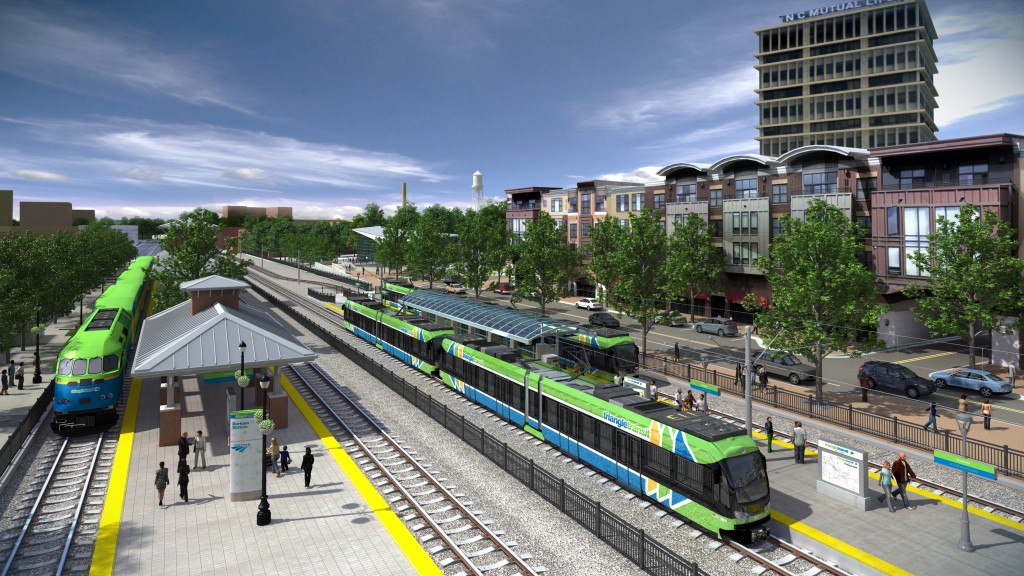
The NC legislature adjourned their session without addressing a damaging cap on state funds intended for a Triangle area light rail project. Their actions were widely decried in the state and circumvented a new bipartisan state process for evaluating transportation projects on the merits and awarding state funds to the best projects, intended to be free from political meddling.
As we previously reported this week, some unknown North Carolina legislators used the budget process to interfere with the state’s new Strategic Investments Law intended to evaluate and select transportation projects based on the benefits in an attempt to stop a rail transit project that’s already been selected for state funds. The unknown legislators’ action to insert a provision cutting the state commitment to a Durham-Chapel Hill light rail link from $138 million down to $500,000. drew wide condemnation from the state’s Republican governor, members of both parties and even legislators that also don’t like this particular project.
Early this morning, the North Carolina legislature adjourned their session without approving an amendment to remove that cap, leaving the state funds for the project in limbo for now. The House successfully passed an amendment to remove the cap by a large margin, but the Senate did not vote on it and referred it to committee, ending any chance to deal with it until the legislature reconvenes in April 2016, according to the Raleigh News & Observer.
The project is rolling forward for now with it’s environmental impact statement, and the GoTriangle transit agency is optimistic that the cap can be removed in the next session after such a strong showing in the State House.
All of this damages an improved process that was supposed to remove this kind of political maneuvering from deciding which projects are funded and which are not. From McClatchy via Mass Transit Mag:
[Durham Senator Mike] Woodard mentioned how well the Durham-Orange Light Rail line scored with the strategic transportation investments law (STI). The STI created a formula using “data-driven scoring and local input” to help determine what projects would get funding through the State Transportation Improvement Program (STIP). … “There are certainly Senate members who are not fans of transit,” McKissick said, adding members believe that politics have been put “right in the middle” of the discussion and debate of public transportation. McKissick said funding through STIP was a way to remove politics from the process.
Earlier this week, we included testimony from North Carolina Governor Pat McCrory, who was proudly touting his state’s new process for evaluating transportation projects before the House Transportation and Infrastructure Committee. His later exchange with Rep. Crawford is worth reading in full:
Representative Crawford: Your State took on a pretty big change in your transportation project selection process. What prompted you to do that? Talk about that a little bit.
Governor McCrory. Well, we were making a lot of decisions on our roadbuilding based upon politics. And as you went down, we did not have the interconnectivity that we should have had. You would go down from the East to the West, North to the South, and we would have highways going from two lanes to four lanes back to two lanes back to eight lanes. And it made no rhyme or reason on why the roads were wide in one area and very narrow in others. And we also saw that it was not an efficient use of limited tax dollars. So in a bipartisan agreement, Republicans and Democrats both agreed to change that formula. …We now base our formula on how we spend money on congestion, on economic opportunity, and on safety, the three major criteria of how we decide to spend the money.
Rep. Crawford: Safe to say that it has been pretty well received by the general public on that transparency and the streamlining the process, taking the politics out?
Gov. McCrory: Absolutely. And I think where I keep bringing up Eisenhower, for each of you, too, is I think as we look for more funding, Mr. Chairman, we need to also show the vision of where we plan to have this interconnectivity from a national perspective, from a regional perspective, from a State perspective, and even, yes, to a local perspective. If we show that, where we are planning to spend that money, and show that we do have a plan and a vision for the next generation and the generation after that, I think people are willing to pay for it. But if we do not have their trust and spend the money as we have always spent it, I do not think we are going to get the trust of the people to increase the amount of funding for transportation.
We’ll keep our eye on this issue over the next year, as will the members of the Raleigh delegation to this year’s Transportation Innovation Academy as they continue advancing plans to bring other new transit service to adjacent Wake County.





